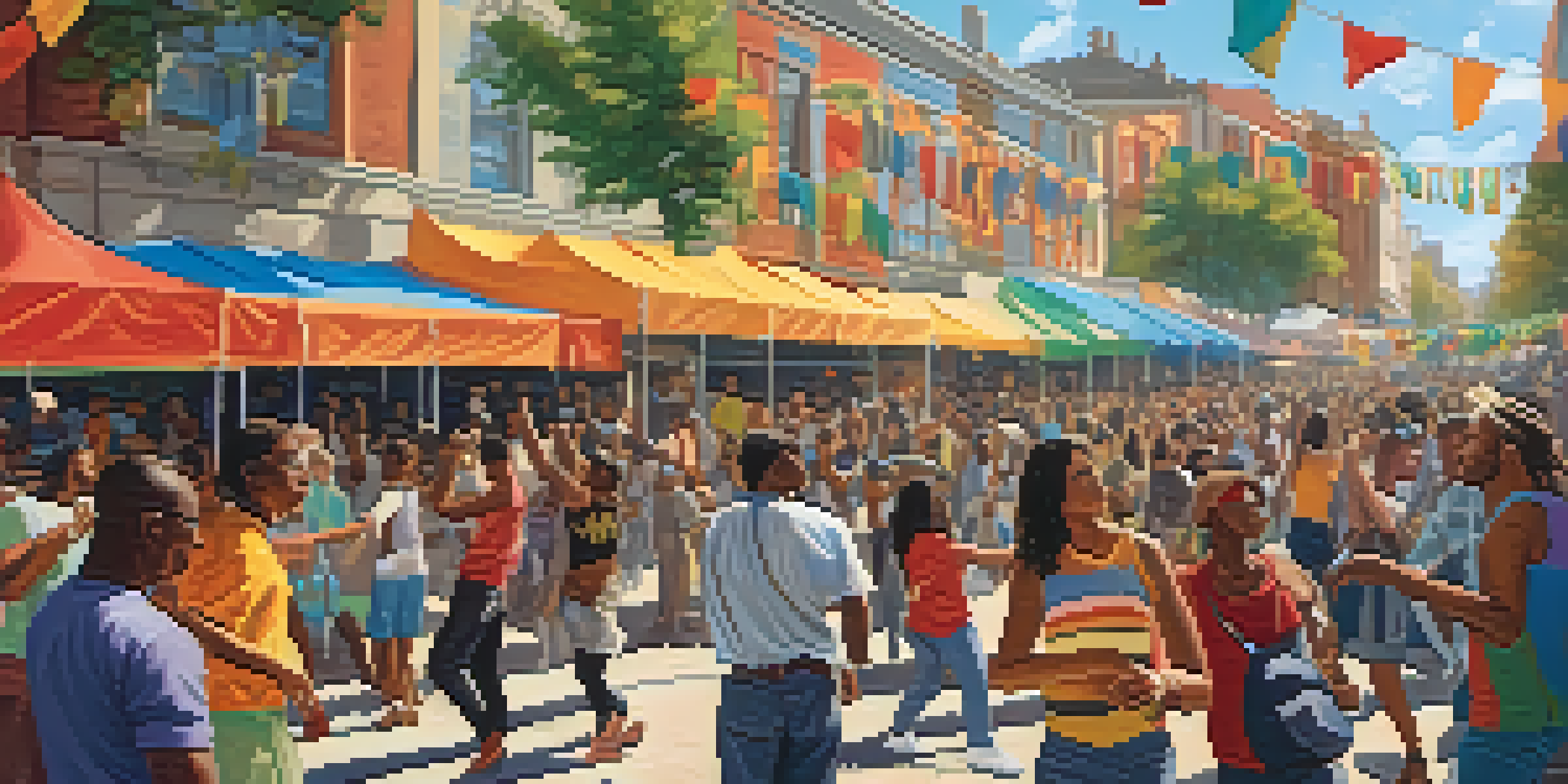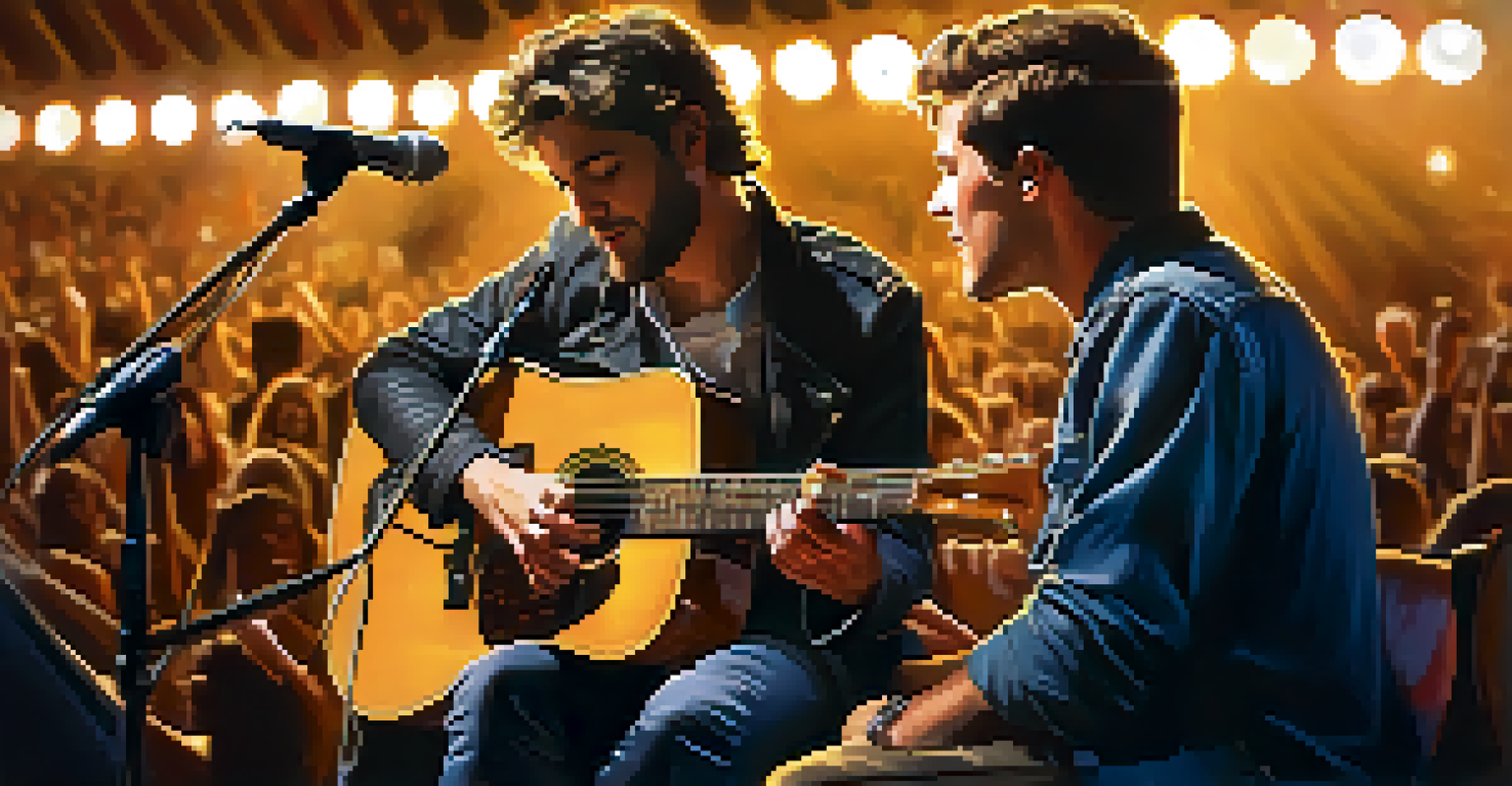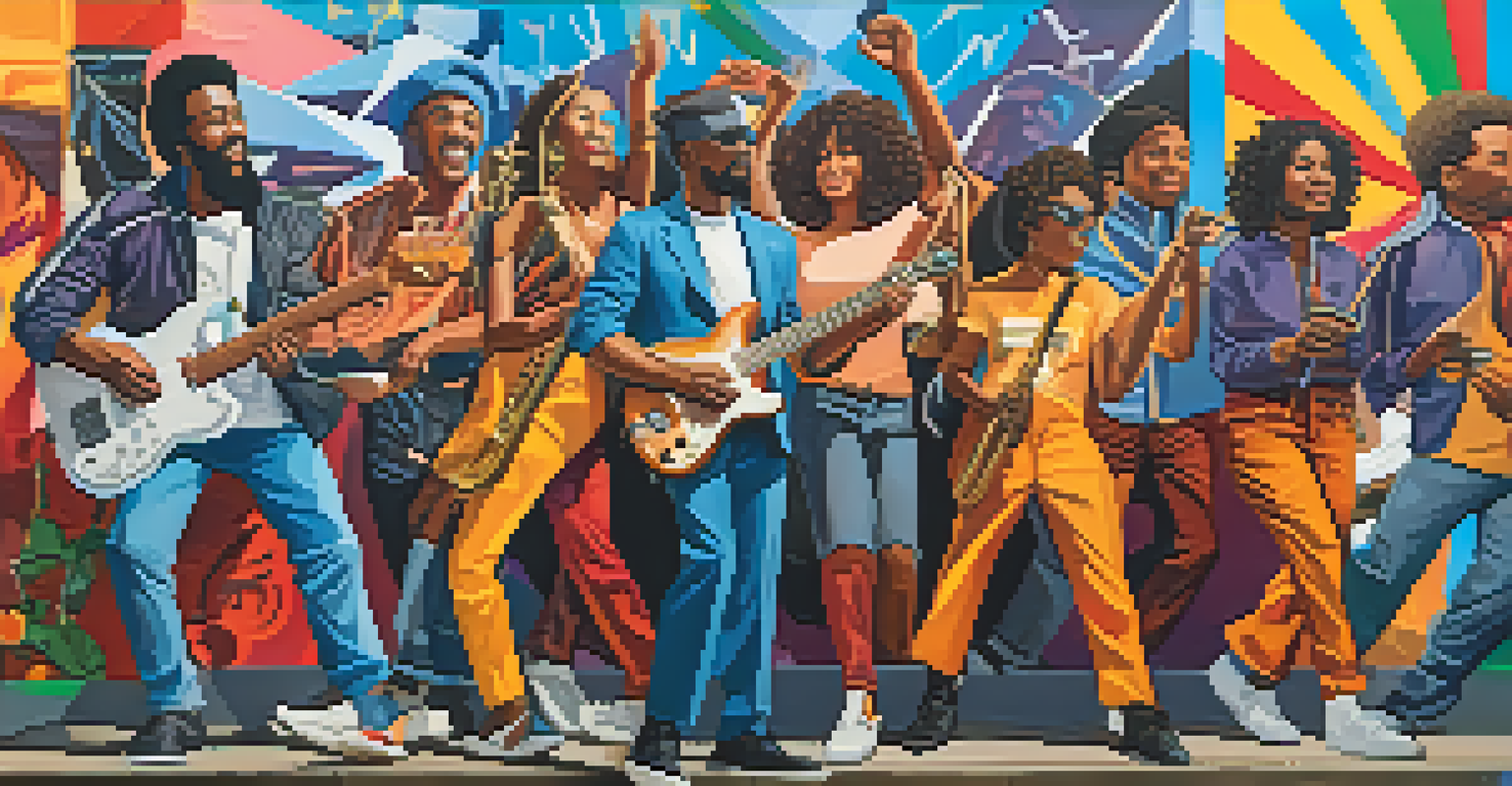The Role of Music in Urban Activism and Social Movements

Music as a Catalyst for Social Change
Throughout history, music has served as a powerful catalyst for social change. From protest songs of the 1960s to contemporary anthems, it has the unique ability to unify people around a common cause. For example, songs like 'Fight the Power' by Public Enemy became rallying cries during the civil rights movement, inspiring action and solidarity.
Music can change the world because it can change people.
In urban settings, where diverse communities intersect, music often reflects the struggles and aspirations of the people. It can amplify voices that are often marginalized in mainstream discourse. By expressing emotions and experiences through lyrics, artists create a sense of belonging and urgency, encouraging listeners to engage in activism.
Moreover, music festivals and concerts often serve as platforms for activism, drawing attention to pressing social issues. Events like the Global Citizen Festival not only entertain but also educate attendees about global challenges, effectively merging music and activism into a powerful force for change.
Historical Examples of Music in Activism
Historically, music has played a crucial role in various social movements, from the labor rights movement to the fight against apartheid. In the 1960s, folk music became synonymous with civil rights, with artists like Joan Baez and Bob Dylan creating songs that inspired a generation. Their music not only chronicled the struggles but also encouraged activism through its poignant storytelling.

Similarly, during the anti-apartheid movement in South Africa, songs became symbols of resistance. The tune 'Nkosi Sikelel' iAfrika' unified people against oppression, illustrating the profound impact music can have in galvanizing communities. These examples highlight how music can transcend language and cultural barriers, fostering a shared sense of purpose.
Music Unites for Social Change
Throughout history, music has played a vital role in unifying communities and inspiring activism around social issues.
In more recent times, artists like Kendrick Lamar and Beyoncé have addressed social justice issues in their music, continuing this legacy. Their songs resonate deeply within urban communities, serving as both a reflection of current struggles and a call to action for social reform.
The Power of Lyrics in Activism
Lyrics play a pivotal role in conveying messages of activism and social justice. They can encapsulate complex emotions and experiences in a way that resonates with listeners. For instance, songs that tackle themes of systemic racism or economic inequality can spark conversations and encourage critical thinking among audiences.
The power of music can make a difference in the world. It can inspire people to take action.
Additionally, powerful lyrics often evoke strong emotions, making them memorable and impactful. When listeners relate to the struggles depicted in a song, they feel compelled to take action, whether that means participating in protests, educating themselves, or advocating for change. This emotional connection can be a significant motivator for activism.
Moreover, social media has amplified the reach of these lyrical messages, allowing them to spread quickly and inspire collective action. Hashtags associated with songs can create movements, like #BlackLivesMatter, where music becomes intertwined with activism, further solidifying its role in social movements.
Community Building Through Music
Music has a unique ability to build and strengthen communities, especially in urban areas. Through local concerts, open mic nights, and community festivals, individuals come together to share their stories and experiences. This sense of community fosters solidarity and encourages collective action toward social change.
In many urban neighborhoods, music serves as a form of expression and identity. It reflects the cultural heritage of the community, allowing individuals to celebrate their roots while addressing contemporary issues. This cultural exchange can empower residents to take ownership of their narratives and advocate for their rights.
Lyrics Spark Activism and Dialogue
Powerful lyrics resonate with listeners, encouraging them to engage in social justice conversations and actions.
Furthermore, collaborative music projects, such as community choirs or hip-hop workshops, can engage diverse groups in dialogue about social issues. These initiatives not only promote creativity but also create a safe space for discussions about activism, allowing community members to voice their concerns and aspirations together.
Music Festivals as Platforms for Activism
Music festivals have become prominent platforms for activism, merging entertainment with social consciousness. Events like Coachella and Bonnaroo often feature artists who use their platforms to address critical societal issues. By incorporating activism into their performances, artists inspire festival-goers to engage with these causes.
These festivals often partner with non-profit organizations, providing attendees with opportunities to learn about various social issues. Booths offering information on voting rights, environmental justice, and mental health create an environment where music lovers can become informed activists. This fusion of music and activism can lead to meaningful conversations and inspire action.
Moreover, the communal atmosphere of music festivals fosters a sense of belonging, encouraging individuals to connect over shared values. This environment can be powerful, as it brings together people from diverse backgrounds who are united in their passion for music and social change.
The Digital Age: Music's Expanded Reach
In the digital age, music's role in activism has expanded dramatically, thanks to social media and streaming platforms. Artists can now share their messages with a global audience, amplifying their reach and impact. A single tweet or video can spark viral movements, demonstrating how music can galvanize support for social causes.
Platforms like Spotify and YouTube provide artists with the tools to create and distribute music that addresses social issues. This accessibility allows emerging artists to share their perspectives and experiences, contributing to a rich tapestry of voices in the activism space. The democratization of music production means that anyone with a message can share it, fostering diversity in activism.
Festivals Merge Music and Activism
Music festivals provide platforms for activism, fostering community engagement and raising awareness about critical societal issues.
Additionally, digital campaigns often accompany music releases, creating a synergistic effect. For instance, artists may use their music videos to highlight social injustices, encouraging viewers to take action. This blend of art and activism is reshaping how movements gain traction and engage audiences across the world.
The Future of Music in Activism
As we look to the future, the role of music in activism is likely to evolve alongside societal changes. With the rise of new genres and platforms, artists will continue to find innovative ways to address pressing social issues. The fusion of music and technology will create new opportunities for engagement and activism.
Moreover, as younger generations become more involved in social movements, we can expect to see a shift in musical styles and messages. These new voices will reflect the unique challenges and aspirations of their time, driving home the importance of music as a tool for activism. The legacy of music in social movements will undoubtedly influence future artists.

Ultimately, music will remain an integral part of the fabric of activism, providing a means for expression, connection, and change. Whether through traditional performances or digital campaigns, the power of music to inspire and unite people will continue to resonate in the heart of urban activism.